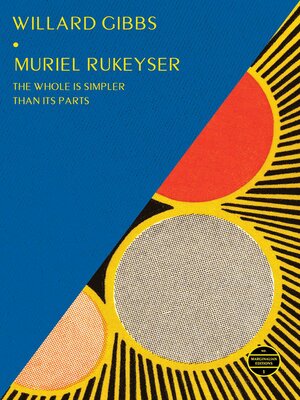
Sign up to save your library
With an OverDrive account, you can save your favorite libraries for at-a-glance information about availability. Find out more about OverDrive accounts.
Find this title in Libby, the library reading app by OverDrive.



Search for a digital library with this title
Title found at these libraries:
| Loading... |
A poet's lost biography of the forgotten scientist who founded physical chemistry, shaping much of the 20th century—as well as an ingenious and expansive treatise on American creativity, character, and remembrance.
Josiah Willard Gibbs (1839–1903) was an American visionary whose work shaped a century of science by bridging classical mechanics and quantum physics. A kindly and shy bachelor who lectured at Yale in relative obscurity for more than thirty years, he single-handedly created the field of physical chemistry without ever completing a single experiment. By applying the second law of thermodynamics to chemistry, Gibbs enabled future scientists to predict what states a substance can assume and under what conditions. The implications for industry, agriculture, and warfare were vast. For this and other achievements he was hailed by Einstein as "the greatest mind in American history"—yet he remained essentially unknown.
To the acclaimed poet Muriel Rukeyser, Gibbs "lived closer than any inventor, any poet, any scientific worker in pure imagination to the life of the inventive and organizing spirit in America." As such, Rukeyser's thoroughly researched and lyrical tribute to Gibbs is much more than a traditional biography. It is an alchemical compound of philosophy, history, ethics, and literature writ large—a monolithic work of homage that is not only the story of a single thinker's far-reaching legacy, but the story of a country, a century, a global epoch of scientific creativity that would color every realm of the human imagination and aspiration, from poetry to politics.
As the iconic author and critic Maria Popova writes in her introduction, Muriel Rukeyser was remarkable American genius in her own right, who won the Yale Younger Poets Award for her debut poetry collection, Theory of Flight, in her early twenties and composed her staggering, more-than-biography of Gibbs before she was thirty. Both an ingenious celebration of the creative spark that burns through boundaries and a gorgeous ode to a forgotten man that was itself forgotten, the Marginalian Editions reissue of Willard Gibbs offers readers a transformative window into two of the most fearlessly original minds in American history.
Josiah Willard Gibbs (1839–1903) was an American visionary whose work shaped a century of science by bridging classical mechanics and quantum physics. A kindly and shy bachelor who lectured at Yale in relative obscurity for more than thirty years, he single-handedly created the field of physical chemistry without ever completing a single experiment. By applying the second law of thermodynamics to chemistry, Gibbs enabled future scientists to predict what states a substance can assume and under what conditions. The implications for industry, agriculture, and warfare were vast. For this and other achievements he was hailed by Einstein as "the greatest mind in American history"—yet he remained essentially unknown.
To the acclaimed poet Muriel Rukeyser, Gibbs "lived closer than any inventor, any poet, any scientific worker in pure imagination to the life of the inventive and organizing spirit in America." As such, Rukeyser's thoroughly researched and lyrical tribute to Gibbs is much more than a traditional biography. It is an alchemical compound of philosophy, history, ethics, and literature writ large—a monolithic work of homage that is not only the story of a single thinker's far-reaching legacy, but the story of a country, a century, a global epoch of scientific creativity that would color every realm of the human imagination and aspiration, from poetry to politics.
As the iconic author and critic Maria Popova writes in her introduction, Muriel Rukeyser was remarkable American genius in her own right, who won the Yale Younger Poets Award for her debut poetry collection, Theory of Flight, in her early twenties and composed her staggering, more-than-biography of Gibbs before she was thirty. Both an ingenious celebration of the creative spark that burns through boundaries and a gorgeous ode to a forgotten man that was itself forgotten, the Marginalian Editions reissue of Willard Gibbs offers readers a transformative window into two of the most fearlessly original minds in American history.






